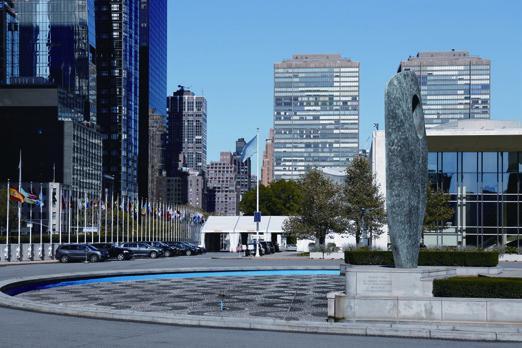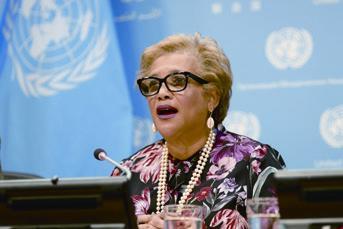Budget Maneuvers
2019-11-27ByGaoFei&PengXin
By Gao Fei & Peng Xin
The UN found itself with a defi cit of $230 million at the end of September. UN Secretary General António Guterres said on October 8 that he had written to member states “about the worst cash crisis facing the UN in nearly a decade.”

This is not the first time the UN has been struggling fi nancially. These problems emerged as early as the 1980s, deteriorating later and reaching a peak in the 1990s. Due to $1.3 billion in unpaid dues in the past two years, the UN is once again facing extreme difficulties. According to the UN website, as of November 12, only 135 of the 193 member states had paid their 2019 regular budget assessments in full.
Political defaults
Why does this UN financial crisis occur repeatedly? As an intergovernmental organization, the UN is funded by its member states and the contribution of each country is calculated on the basis of the scale of assessments. However, many members delay or decline to pay their contributions for various reasons, including problems such as a change in their annual budgets or their own fi nancial challenges.
Unlike many others, the U.S., the largest fi nancial contributor of the UN with a share of 22 percent of its regular budget, defaults on purpose in order to put pressure on the world body or to make known its political views. According to the UN, the U.S. owes $674 million for the 2019 regular budget and $381 million for previous regular budgets. This is what is at the root of the UNs recent lack of liquidity.
After the end of World War II, the U.S.insisted the UN be headquartered in New York City, which was partly to draw from the lessons of two world wars and shape the postwar order, and partly to strengthen its influence on the UN. During the Cold War, and especially throughout the 1980s, the U.S. frequently delayed its contributions to the UN in order to foil the Soviet Union regarding personnel selection for important organs or resolution-making. Since then, withholding dues has become a regular U.S. leverage to place the UN in a straitjacket.

However, with the ascendancy of emerging markets and developing countries, the decline of the Western dominance is inevitable. Meanwhile, developing countries tried to reform the multilateral cooperation platforms which were designed to serve Western countries. To curb this trend, some developed countries went against the historic tide by resorting to unilateralism and trade protectionism, trying to retain their advantages.
For example, since Trump took office, the U.S. Government has challenged the rule-based multilateral system, withdrawn from international organizations and upheld an America First policy.
At the general debate of the UN General Assembly in September, Trump reiterated his countrys anti-globalization stance by saying“the future does not belong to globalists.” As the U.S. attitude and policy toward the UN continues to worsen, the global multilateral cooperation mechanism slides into deeper trouble.
The UN is the most critical multilateral organization in the world. If it is paralyzed due to fi nancial diffi culties, globalization and multilateralism will be negatively impacted, infl icting great harm on the worlds future.
Chinas contribution
China has always backed multilateralism and supported the UN to play a central role in global governance. This year, China becomes the second largest contributor to the UN regular budget, with its share rising to 12.01 percent from 7.92 percent. It has already paid its assessed contributions for 2019 in full.
Chinas increased contributions highlight its growing importance on the international political stage.
With the rise of developing countries, the current UN structure cannot meet their demands in many areas, including the institutional design, personnel management and discourse systems. Thus it needs to be reformed and improved. China has actively shouldered its responsibility as a major country, promoted the reform of the global governance system and worked with other countries to create more benefi ts for all.
In todays world, fair, reasonable and inclusive multilateral cooperation for the benefi t of all is the trend of development. China will continue to actively participate in multilateral affairs led by the UN and contribute Chinese wisdom to global governance.
